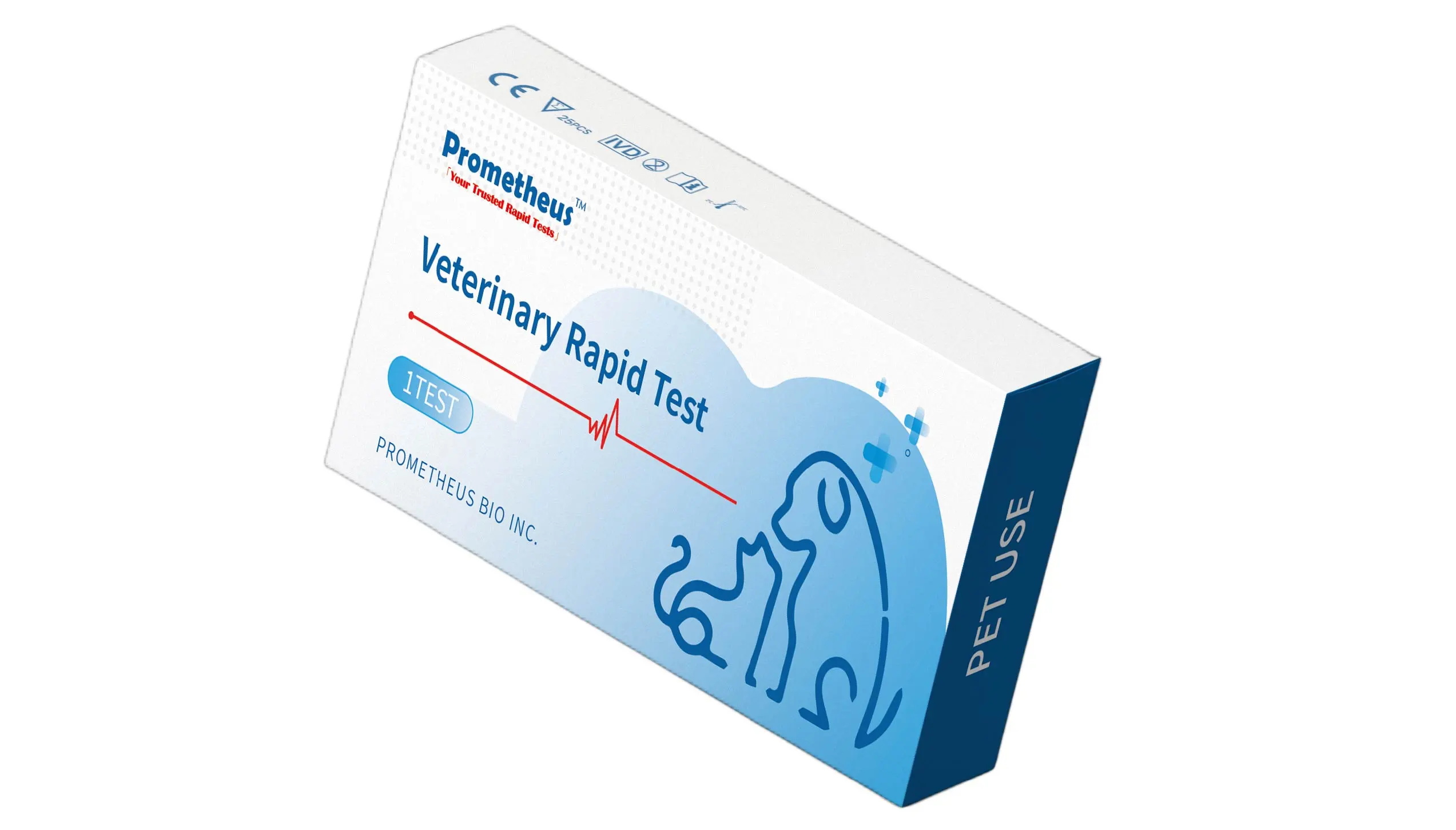Veterinary Rapid Test Kits

Opis produktu
Veterinary diagnostic tests are medical devices used to diagnose and monitor animal health conditions. Veterinary test kits play a critical role in the early detection and prevention of animal diseases and infections, allowing you pay a better attention to Pet Health. Prometheusbio is a professional veterinary rapid test kits supplier, providing veterinary rapid test kits with competitive pricing.
Veterinary diagnostic tests, such as CPV test for dogs are laboratory tests used to diagnose diseases in animals. These pet health tests use a variety of methods, such as blood tests, urine tests, swabs, tissue samples, and imaging to evaluate the animal's health. Veterinary diagnostic tests are essential in detecting and identifying diseases affecting both domestic and wild animals. They help in the identification and treatment of diseases, monitoring the progression of a disease, and assessing the effectiveness of therapy. Common veterinary diagnostic tests include Complete Blood Count (CBC), serum biochemistry, fecal tests, imaging tests, and tests for diseases such as heartworm, feline leukemia virus, and rabies. Veterinary diagnostic tests are critical in animal health care and public health.
Types of Veterinary Rapid Test Kits
Dog Health Tests
The canine range of veterinary diagnostic tests refers to a collection of laboratory tests done to assess the health of dogs. These include Complete Blood Count (CBC), biochemistry tests, urinalysis, fecal tests, imaging tests, and tests for specific diseases such as heartworm and Lyme disease. These tests help diagnose, treat, and prevent disease in dogs.
Canine Range Rapid Tests
Canine Adenovirus Type - II Antigen (CAV Ag) Test
Canine Coronavirus Antigen (CCV Ag) Test
Canine Distemper Virus Antigen (CDV Ag) Test
Canine Influenza Virus Antigen (CIV Ag) Test
Canine Parvovirus Antigen (CPV Ag)Test Kit
CDV+CAV-II+CIV Antigen Combo Test
CPV + CCV Ag Combo Test
Feline Range Tests
A wide number of laboratory tests are included in the feline spectrum of veterinary diagnostic tests to assess the health of cats. Complete blood count (CBC), biochemistry, urinalysis, fecal test, imaging test, and testing for particular disorders like feline leukemia virus and feline immunodeficiency virus are some of the examinations on this list. These examinations support cat disease detection, treatment, and prevention.
Feline Range Rapid Tests
FCoV Antigen (FCoV Ag) Test
FCoV+FPV Antigen Combo Test
Feline Calicivirus Antigen (FCV Ag) Test
Feline Herpes Virus Antigen (FHV Ag) Test
Feline Panleucopenia Virus Antigen (FPV Ag) Test
Other Veterinary Diagnostic Tests
Other Veterinary Diagnostic Tests
It mainly includes the Toxoplasma IgG/IgM test, which is a blood test that detects the presence of immunoglobulin G (IgG) and immunoglobulin M (IgM) antibodies against the parasite Toxoplasma gondii. It helps diagnose a current or past infection of Toxoplasma gondii, which can cause toxoplasmosis, a disease that may be asymptomatic or cause flu-like symptoms, fever, or even serious complications in individuals with compromised immune systems.
Toxoplasma IgG/IgM (Toxo Ab) Rapid Tests
Veterinary Diagnostic Tests Faqs
Q.
Why Are Veterinary Diagnostic Tests Important?
A.
Veterinary diagnostic tests are important because they help veterinarians diagnose and treat illnesses and health conditions in animals. They are also critical in monitoring the progression of diseases, assessing the efficacy of therapies, and preventing and controlling outbreaks of infectious diseases.
Q.
How Are Veterinary Diagnostic Tests Performed?
A.
The type of test required will depend on the animal's symptoms, history, and physical exam. The most common diagnostic tests include drawing a small amount of blood, collecting a urine sample, taking radiographs, and collecting fecal samples.

